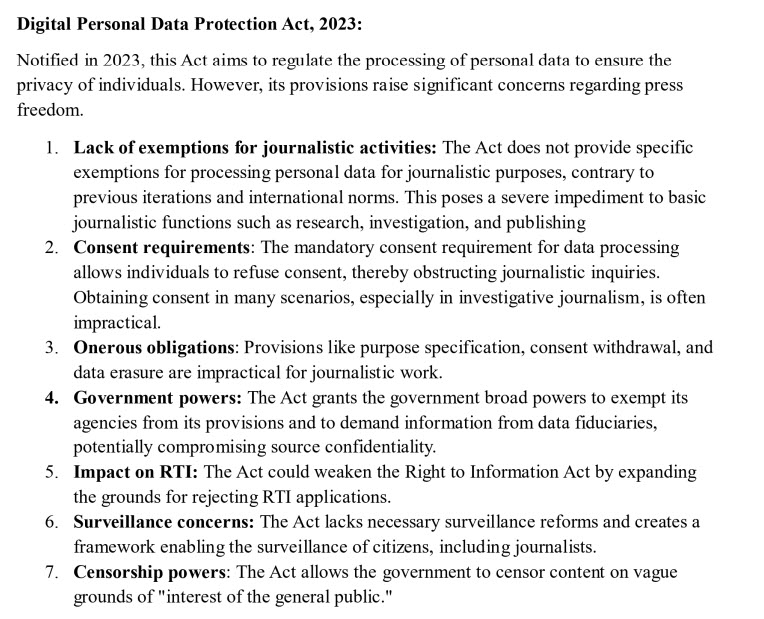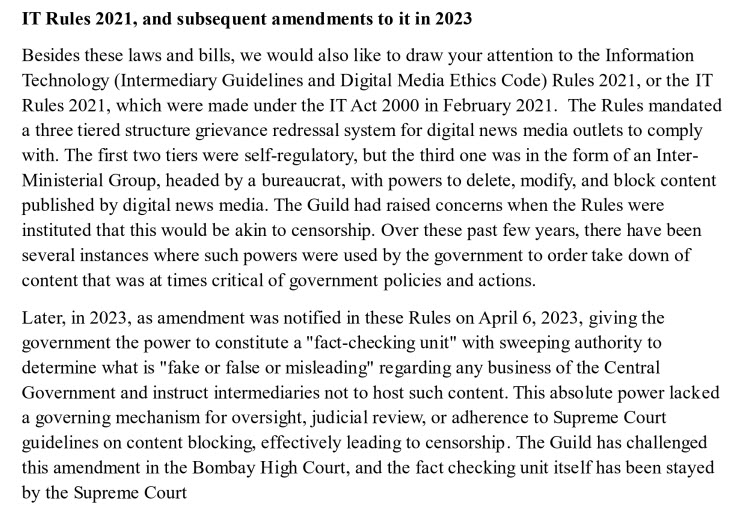Following are the objections raised by Editor’s Guild of India on DPDPA which require some comments.

Objections have also been raised on ITA 2000 as follows.

Earlier on February 18, 2024 EGI had sent a more detailed note to MeitY a copy of which is available here
The objections raised were to “Need for Prior Consent”, ” Purpose declaration”, “Withdrawal of Consent” and” power to call for information”. To this the RTI, Surveillance and lack of exemption has been added in the recent representation sent to the leader of opposition.
This could therefore be a point of debate during the Parliamentary session starting from tomorrow and even lead to disruption of this session and walk out by the opposition.
Let us see whether these 7 demands of EGI is justified. Views may differ and EGI has every right to interpret the Act and the proposed rules in a manner that suits their narrative. Our discussion can be more neutral.
Lack of Exemption:
There are hundreds of professions and industries and granting exemption to one industry or class will certainly raise a claim of discrimination. Hence Exemptions have to be handled with circumspection.
It should be noted that Journalists can work for an organization as employees or independently. If they work for another agency, the liability will be on the media. If they work independently they will be data fiduciaries by themselves. They will also be handling information which is sensitive to national security, electoral democracy etc. Hence they would be “Significant Data Fiduciaries”.
There are similar issues in Medical Practitioners who work independently and as employees of a hospital or Lawyers who work for a firm or independently or Charted Accountants and Business Analysts who work for themselves or for other organization’s. All these “Professionals” belong to a common category.
As far as these professionals act for a “Business Purpose” they will not have exemptions.
Currently exemptions are provided under Section 17(2) as follows
(a) by such instrumentality of the State as the Central Government may notify,in the interests of sovereignty and integrity of India, security of the State, friendly relations with foreign States, maintenance of public order or preventing incitement to any cognizable offence relating to any of these, and the processing by the Central Government of any personal data that such instrumentality may furnish to it; and
(b) necessary for research, archiving or statistical purposes if the personal data is not to be used to take any decision specific to a Data Principal and such processing is carried on in accordance with such standards as may be prescribed.
Apart from this Government may notify certain class of data fiduciaries to exempt them from “Prior Notice”, “Right to Access”, “Significant Data Fiduciary requirements” and “Erasure of personal data on withdrawal of consent or expiry of purpose”. However where the processing of data is likely to result in a decision that effects the Data Principal or disclosed publicly, the Government may not like to provide the exemption.
Investigative Journalism and Media Trials are always disputed and carry the risk of counter attack in the form of “Defamation”. In such cases, it is the responsibility of the Courts to come to the assistance of any unfair targeting of journalists and Indian Courts are more than obliging in this respect.
If an exemption is provided, the definition of a “Journalist” comes to a question and whether every YouTuber or Blogger should be treated as a Journalist needs to be resolved. The exemption is likely to be misused by that class of Journalists who are today commercial scribes and not part of the respected “Fourth Pillar of Democracy”. The leading fake news creators in India are funded from abroad and all of them are even registered as Journalists.
Hence providing “Exemption” does not seem to be a good idea. Government may still do it since it may not want to displease the Journalist community. This can be done easily through the rules where exemptions for “Research” may be defined as including “Journalistic Research”.
When journalists interview public and take their views, it can be considered as “Voluntary Provision of Data” and a “Legitimate use”. There are always situations where the source may request for anonymity and it is the duty of the journalist to provide it. Similarly when there is a “Withdrawal of Consent”, if the data has not yet been disclosed it can always be anonymised as media do at present. If it has already been published it has been my view that it becomes part of history and should not be tampered with. If there is a wrong reporting, it can be corrected with a counter view rather than tampering with a published information.
Other Objections
The other objections on surveillance, Censorship, RTI etc are political comments and can be ignored.
The objections on the “Fact Checking” are false and it was unfortunate that Bombay High Court went with the claim that the notification was meant to exercise power to curb genuine news. The Fact Checking unit was only to flag the fake news so that a Court may consider a complaint without the protection under Section 79 ITA 2000. It did not by itself penalized any organization.
Further the Government has given an option to Social media to create its own self regulatory mechanism to resolve complaints before it is escalated. Without using the provision, media is only complaining that their freedom has been affected.
The Right to erasure is subject to other laws and a journalist can always exercise his right to retain the data until his legal interests are not threatened. If we consider that after the data is made public through any disclosure through a journalist it would amount to making data publicly available, there would be no reason to worry. Let us remember that a journalist can always withhold the personal data (anonymise or pseudonymise) and release a news worthy story. If the information released is of a crime, it is for the law enforcement to take necessary action under due process of law.
I suppose no journalist has a right to suppress criminal information under his journalistic privileges since his basic commitment is to public good and protecting the identity of criminals is certainly not for “Public Good”
I therefore feel that the EGI’s contentions are borne out of mis conceptions and distrust of the regulation and there are ways and means to handle the concerns. For this purpose, Journalists should move towards self regulation.
Self Regulation
When FDPPI offered Bangalore journalists for creating a self regulatory body under the ITA 2000, there was no response and the Guild preferred to go to Court to get the notification itself scrapped. Even now FDPPI invites representatives of Press to join hands with FDPPI in creating a Special Interest Group (SIG) to discuss the impact of the Act and the Rules on the Journalists and be a part of the “DPDPA Advisory Group for the Media industry”.
FDPPI is inviting a discussion on DPDPA Rules on July 27 to form such SIGs for multiple industry segments and an invitation has been sent to EGI also to participate. An attempt has been made to invite some media persons in Bangalore through the Press Club and let us see if they respond.
Not doing anything when required and complaining later is the common problem with most of the professionals and I hope Journalists will be an exception.
Naavi







